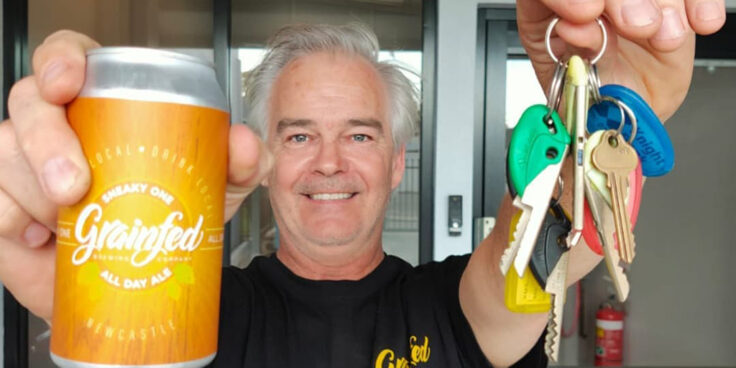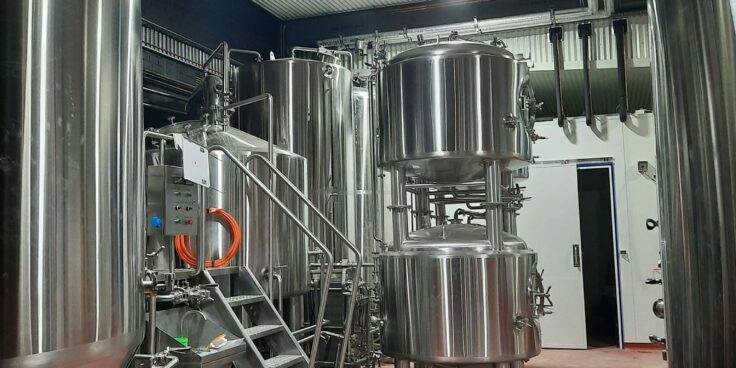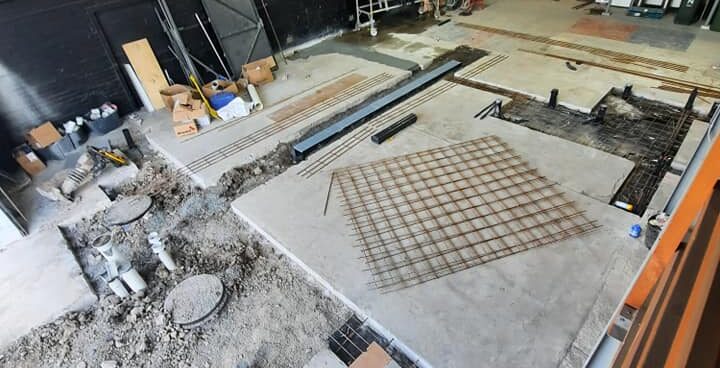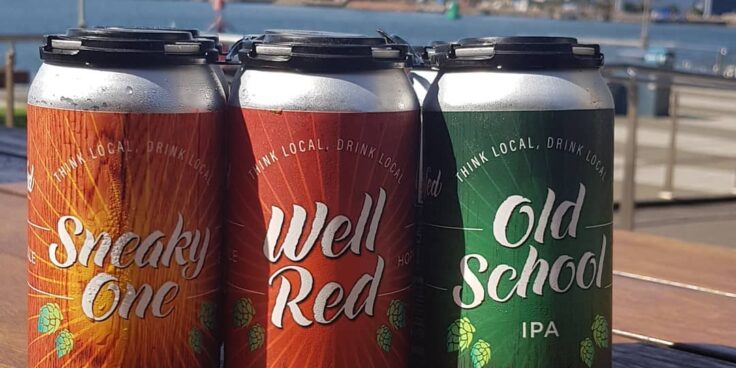
Grainfed Brewing opens in Newcastle

Grainfed Brewing opened its doors in Newcastle late last month, with founder and head brewer Lachlan McBean achieving his long-term dream after 19 years in the brewing industry.
McBean said that to navigate what has become a highly competitive brewing industry in Australia, Grainfed is going back to basics.
“We’re going to continue to make really good quality beers with great drinkability and have a venue that’s friendly and welcoming for a wide variety of people,” he said.
“Good old-fashioned service seems to be pretty rare these days, so we want to have a great venue that people can come to and get good service behind the bar.
“It’s a pretty easy job – all you’ve got to do is be nice to people, ask them how they’ve been, how their day is and just be human, really.”
Small and locally focused
McBean also wants to keep his business small and nimble by focusing on maintaining and growing Grainfed’s local and regional presence.
“I’m probably looking to focus even more locally than I was,” Lachlan said.
“Personally, I’ve never wanted to be a national brand.
“To have a sustainable business model, I reckon you don’t have to continue to chase growth; you get to a certain level, and you’re happy there.
“I’ll just continue to focus on local wholesale and the local region and focus pretty heavily on our venue, getting people into that and serving the surrounding suburbs and the rest of Newcastle.”
As part of his local approach, McBean wants to avoid selling his beer outside of New South Wales.
“I look at it and I think – what does beer made in Newcastle mean to someone in Melbourne or Perth or Brisbane? I think there is enough,” he said.
“Brisbane itself has 25 plus breweries and South East Queensland has gone nuts in the last 5 years with all the growth with the breweries coming in there.
“I always wanted to make the freshest beer that I can and give people the freshest beer that they can have, so sending it interstate and on trucks and in warehouses for long periods of time and long distances doesn’t make sense to me.”
While he hopes to accomplish some growth, he doesn’t want Grainfed’s annual production to exceed 300,000 litres.
“Last year [our annual production] was about 25,000 litres using other people’s equipment,” he said.
“With the taproom and growth in annual production, it would be about 100,000 litres this year.
“We’re set up to be able to do about 180,000 to 200,000 litres with our current tank configuration, so if we can get there in a couple of years, then happy days and we could buy some more tanks.
“Again, I don’t need to be massive; if I can sit under 300,000 litres and have a good, sustainable business, then that’ll do me.”

Brewing industry decline
Grainfed launched 11 years ago as a nomadic brewery when the craft beer sector was on the rise in Australia.
Because the industry’s growth has waned since he began seriously planning his brewery build 2.5 years ago, he said he wouldn’t make the same decision to start a brewery now.
“I look at a lot of people opening up now from scratch and I wouldn’t be doing that,” he said.
“Mine is a calculated risk, a considered risk, but obviously still a risk – any business is.
“I’ve stopped watching the news and I don’t read the paper.
“It’s all pretty grim out there at the moment in some areas, so we concentrate on what we’re doing and look forward.
“I’m happy with the position we’re in.”
Building a brewery of his own
While he has been involved in a few brewery commissionings over the years, McBean said it’s different when it’s your own.
“When I’ve consulted for other people and put their equipment in, I’ve been walking away from it.
“The realisation that that’s me for the next 10 or 15 years is a great feeling but it can be a little bit daunting sometimes as well.
“The money is yours, so you watch what you spend a little bit more.
“It took me a couple of brews to realise that it was actually my equipment.
“It sounds a bit odd, but I realised no-one is here, it’s just me and wow – this is mine.”

Thanks to his brewing experience, McBean said he thinks he and his team got the brewery 95 per cent right, but he would do a few things differently in terms of placement and measurements if he were to have his time again.
“The brewing part of it I’ve got pretty much 99 per cent right, so it was more the bar and how that flows.
“I was heavily involved with my architect in the design of both the brewery and venue.
“Project managing a build like that and also trying to maintain wholesale sales is difficult.
“It was long hours to get the planning right, but some things in the bar that most people wouldn’t notice [aren’t perfect], like the benches are probably too deep.”
Despite this, Lachlan is satisfied with the brewery and venue.
“You make do with the area that you’ve got,” he said.
“Until it’s there in place and you’re working at it every day, you’re not going to know.
“Nothing needs to be changed at all really – we’ve just got to live with what we’ve got and how we’ve done it.”
Canning line considerations
McBean said that COVID-19 pushed him into using cans for his beer, but he was hesitant to jump in and buy a canning line.
“We’re just getting a mobile canner to start with,” he said.
“I looked at getting a small canning line, but I didn’t really know.
“I thought if I buy one too small I’ll outgrow it too quickly and if I buy one too big it will sit in the corner and do nothing for three weeks at a time.
“So, for the first 6 to 12 months I’ll just use a mobile canner to get a gauge on how often we’re using it and then look to get the right size canning line accordingly.
“The other thing is there’s not a heap of room for it either, so that’s a big factor.”

Council red tape
Lachlan said the journey to opening his brewery was a long and at times arduous one, but bringing a few important experts onto his team paid off.
“I walked into my building in May 2021 and signed a lease, put it through the council, got all the town planning sorted out… and put a DA in in December 2021.
“We didn’t get that approved until August 2022, so it’s been two years from when I walked into the building to when we opened.
“Fortunately we didn’t have to build much as it was an existing building.
“So far our landlord has been great; it helps that he likes beer as well.”
He recommends hiring a good town planner from the beginning, as well as a project manager.
“To try to navigate through the council and through all the regulations and the red tape, you definitely need someone who knows what they’re doing,” Lachlan said.
“When you get to the point when you’ve got to put a DA in, the town planner is vital.
“I did use a project manager as well for about three months, which is the best thing I ever did because they pretty much controlled what the trades were doing.
“We had a timeline… and they were really good at cracking the whip and getting them to get their stuff done and get out so we could move on to the next stage.
“Because of that the build itself was quick: four months from cutting the first concrete for drainage to opening the doors.
“It’s amazing what a case of beer can get you – with tradies it’s worth more than Gold!”
But it wasn’t all smooth sailing, and Lachlan thinks it’s difficult for anyone to deal with the council when seeking approval for a development application, not just brewery owners.
“I think they do understand breweries because I’m the eighth physical brewery to come to Newcastle, so they know what it’s about.
“I hear it from people all the time when they’re doing house renovations – it’s just a hard slog.
“I’ve got a bit of a feeling that a lot of the planning laws are state-based rather than locally-based, so the council has just got to do what the planning laws say.”
In saying this, Lachlan still found the approval process for Grainfed Brewing frustrating and costly.
“As a small business owner with the ability to make things happen quickly, it was at times frustrating dealing with government bodies that have no concept of the financial and mental costs involved.
“I’m sure the council has done everything for a reason, but to the layperson it doesn’t make a lot of sense when you can’t do something because of this, this and this.
“It was a frustrating 4 months of back and forth about parking, but we just kept pushing back and holding our ground.
“They are risk averse and they don’t want to be sued, so you’ve got to get consultants in to cover everything.
“We had to use four or five consultants and we spent about $35,000 in consultancy fees to get reports for various parts of the DA just so they could tick it off.”
Point of difference
Looking to the future, in addition to his commitment to keeping Grainfed Brewing small and local, Lachlan has a few other ideas about how he will differentiate his brewery.
“We’ll use my judging experience to run beer education and training sessions.
“I’ll tell my story a bit and share how we started.”



